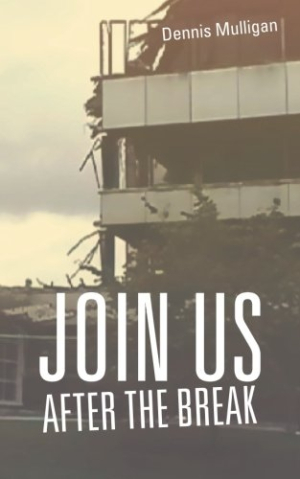Join Us After the Break
These anecdotal gems stand out with a beauty most humor stories don’t even attempt.
Nostalgic for a time when “instant great ideas” were given credence and the men behind the cameras were like a fraternity of big kids, happy to be a part of the world of television, retired cameraman Dennis Mulligan’s writing is reminiscent of Bill Bryson and sometimes Douglas Adams. With colorful storytelling, wit, and humor, Join Us After the Break unveils just a handful of anecdotal gems from the years when color TV was cutting edge.
Mulligan starts by describing the destruction of a building that was home to Scottish Television (STV) for many years. “With the dust still swirling, I imagined that I could hear the whispered gossip of a hundred canteen conversations carried in the blustery wind.” Mulligan doesn’t take advantage of the sentimentality of the moment, but he does adopt a very real tone of loss as he recalls what it was like to work at the studio early on: “It was a thrill to come to work each day, but that ethos has all gone.”
What follows this rather somber and reverent introduction is a compact series of memories told with flair. The text relies heavily on clever similes—“like a child entering a darkened Santa’s grotto,” “like Battle of Britain pilots waiting for the call to scramble,” “like the bar in Star Wars”—which are playful and descriptive, but feel crutch-like when employed too frequently.
While not everyone will be familiar with the sporting events, TV shows, and personalities of Scottish Television through the 1970s and ‘80s, a recognizable human element shines through in each brief chapter. Unbelievably bad ideas, like trying to take aerial footage from a helicopter while the camera is connected to a chord on the ground, or nearly knocking out the “long-legged blonde Hollywood” star of Supergirl with an errant bright green Frisbee, keep the back-cover’s promise that this “narrative never goes higher than the second floor.” There is no executive oversight, no internal markets or shareholder dividends, which herald the end of this golden era in Mulligan’s epilogue.
With a foreword and epilogue that both reference the loss of a special “ethos” present only for a brief time in the television industry, Mulligan has more to share than a smattering of witty stories. He has framed all of the joy and recklessness of early television with the bittersweet solemnity reserved for celebrating the lives of friends who have passed. It has a beauty many humor books do not attempt and, as such, it makes a surprising contribution to the genre.
Reviewed by
Sara Budzik
Disclosure: This article is not an endorsement, but a review. The publisher of this book provided free copies of the book and paid a small fee to have their book reviewed by a professional reviewer. Foreword Reviews and Clarion Reviews make no guarantee that the publisher will receive a positive review. Foreword Magazine, Inc. is disclosing this in accordance with the Federal Trade Commission’s 16 CFR, Part 255.

